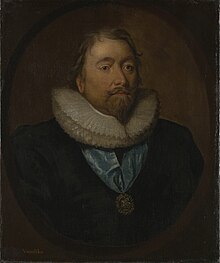Richard Weston, 1st Earl of Portland
|
The Right Honourable The Earl of Portland KG PC |
|
|---|---|
 |
|
| Chancellor of the Exchequer | |
|
In office 1621–1628 |
|
| Monarch | James I Charles I |
| Preceded by | The Lord Brooke |
| Succeeded by | The Lord Barrett of Newburgh |
| Lord Treasurer | |
|
In office 1628–1635 |
|
| Preceded by | The Earl of Marlborough |
| Succeeded by | In Commission until 1711 |
Richard Weston, 1st Earl of Portland, KG (1 March 1577 – 13 March 1634/1635), was Chancellor of the Exchequer and later Lord Treasurer of England under James I and Charles I, being one of the most influential figures in the early years of Charles I's Personal Rule and the architect of many of the policies that enabled him to rule without raising taxes through Parliament.
Weston was the eldest son and heir of Sir Jerome Weston, High Sheriff of Essex for 1599, and the former Mary Cave. He was born at Roxwell, Essex, and was a student of the Middle Temple. He served as Member of Parliament (MP) for a number of constituencies including Maldon (1601–1603), Midhurst (in the parliament of 1604-1611), Essex (in the Addled Parliament of 1614), Arundel (1622), Bossiney (1624), Callington (1625) and Bodmin (1626). He was knighted in 1603.
During the reign of King James I of England, Weston was sent on embassies to Bohemia, Brussels, and Spain. On the last assignment, he negotiated for the restitution of the Palatine. Upon his return to England in 1621, he was made Chancellor of the Exchequer, and retained the post after the accession of Charles I; he proved a capable financial manager but incurred popular hatred as a (justly) suspected Roman Catholic, while also later earning the enmity of the (Catholic) queen, Henrietta Maria for refusing grants to her favourites. He opposed wars with Spain in 1623 and France in 1626, but managed to find ways of raising the money to fund them when required, even when it was impossible to secure the co-operation of Parliament.
...
Wikipedia
